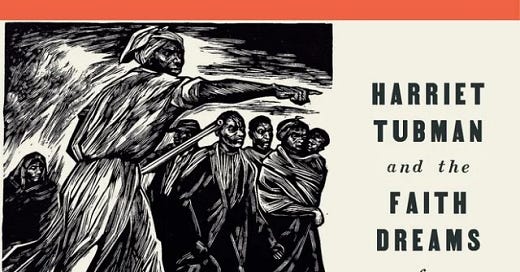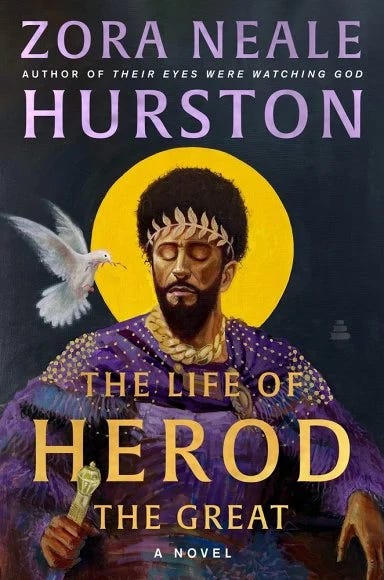My Black History Month 2025 Reading List
The Life of Herod the Great, Night Flyer & On Tyranny
Welcome to my new subscribers and welcome back to my OGs. So much is vying for your attention, so I appreciate you visiting my erratic book musing neck of the Internet.
While I’ve been catching up to my personal life, I’ve also been catching up on my reading, slowly but surely, including a couple of leftovers from the end of last year. Of these, one of my favorites was Tiya Miles’ Night Flyer: Harriet Tubman and the Faith Dreams of a Free People, focused on revealing more of the humanity of Harriet Tubman, whose life has been mythologized in ways that don’t entirely do her justice.
Night Flyer was a little lengthy to me, but that’s what it takes to be exhaustive about a legendary American. Harriet Tubman is one of my favorite historical figures, and I feel like I am always learning more about her. During my research for my debut novel, Women of the Post — dedicated to General Tubman — I learned that Tubman was one of the first recorded Black women to lead a major military operation during the Civil War. I dedicated the book to her, and to all Black women veterans erased in our history, because it has taken me until my adulthood to gather the different pieces of this history of hers, this long tradition of Black womens’ military service and it’s a history all our children should know. Particularly because we are too often reduced or diminished as critics of patriotism, as opposed to torchbearers for love of a country that is, at best, indifferent to us, at worst, overtly hostile and trying to kill us. I believe it was Toni Morrison who alerted me to the fact that Tubman had to fight for the pension she was due for her service. Eventually, she won.
In any event, I was reminded from Night Flyer that Harriet Tubman became disabled early in life while she was enslaved — and it is new for me to think of Harriet Tubman as a person with a disability. This is the kind of erasure that even well-meaning historians — in Tubman’s case, mainly white women historians — participate in when repeating oral histories or attempting to reconstruct lost histories. It made me wonder if talking about Tubman and her disability felt like it would change the way others viewed her. It only made me respect her complexities more, and look forward to the work that is underway to talk more about her life in the context of disability.
I was particularly moved by the context Miles created for the way Harriet Tubman moved through the world, her connection to her faith and to wilderness in particular. This passage stayed with me:
The wilderness she encountered at the time of adolescence threatened and simultaneously transformed her life. It was a place of confounding double meanings: negative and positive, dreadful and revelatory, metaphorical and physical. And beyond this, the concept of a “wilderness experience” has two connotations in traditional Black culture that have changed over time, the theologian Delores Williams has explained. Starting around the turn of the twentieth century, African Americans usually represented the wilderness as a psycho-emotional circumstance of suffering, “a near-destruction situation in which God gives personal direction to the believer and thereby helps her make her way out of what she thought was no way,” Williams has written. Prior to 1900 and dating back centuries, though, an older sense of the term took a more hopeful cast, emphasizing the physical wilderness as a special space of religious experience described by enslaved people in songs and stories…Wilderness for them — dense vegetation and tree cover — was an actual site of spiritual refuge. In these natural places out of view, seekers might expect to have profound religious experiences.
Among other things folks may not know about me, I am a huge fan of the outdoors, particularly of parks and when I can get to it, the forest. More on that again sometime. In the meantime, Night Flyer is beautiful and worth a read.
Speaking of worthy reads, I was perhaps intentionally late to reading On Tyranny: Twenty Lessons from the Twentieth Century by Timothy Snyder. Originally published in February 2017, it has profound lessons for the Black community in particular and in these times: What I loved was the advice to read books, to prioritize community gatherings and to be unafraid to stand out. It’s a short read, with a long Hold time at the library, but still worth a listen or a read, I think, if you’re looking for “things you can do” — or not do — in reactions to the political cruelty that continues to unfurl around us.
Finally, I have been hesitant to write anything about the late, great, Zora Neale Hurston’s book, The Life of Herod the Great, apparently recovered from the ashes of her home late in life. Zora spent more than a decade researching Herod for this novel, which, as you might expect for a posthumous work, has flashes of Zora’s noteworthy beauty in it, but for me, never really came together. I loved learning the context in Zora’s words, about how she became so fascinated with Herod, though. She writes in the preface,
Polybius, the ancient Greek philosopher…lectured to his disciples: Be a realist and a rationalist. Seek the heart of matters. Know history, for there is ‘no more a ready corrective of conduct than knowledge of the past.’ ‘It is history, and history alone, which, without involving us in actual danger, will mature our judgment and prepare us to take right views, whatever may be the crisis or the posture of affairs.’ History may be a lantern of understanding held up to the present and the future.
To that sentiment, I say, amen.






Thank you for this reading list! Harriet Tubman is so fascinating and Night Flyer is now on my list.
Recently finished Night Flyer and loved it! Her book All That She Carried is also really good.